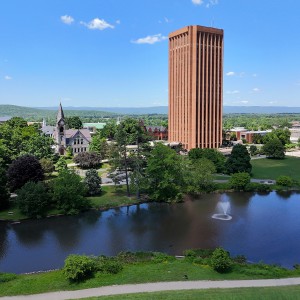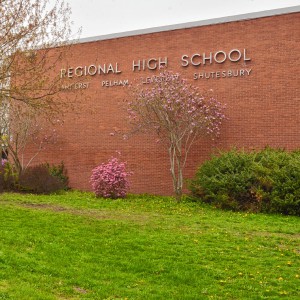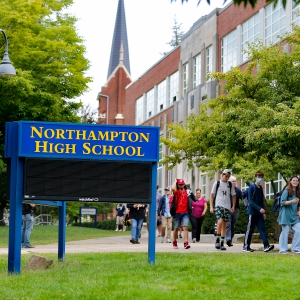Feds revoking visas, terminating student statuses of four more UMass students, bringing total to 10

The University of Massachusetts campus in Amherst. GAZETTE FILE PHOTO
|
Published: 04-09-2025 4:18 PM
Modified: 04-10-2025 12:26 PM |
AMHERST — Federal authorities are revoking the visas and terminating the student statuses of four more international students at the University of Massachusetts, increasing to 10 the number of students at risk of not being able to continue their studies on the Amherst campus.
UMass spokeswoman Emily Gest confirmed that since Chancellor Javier Reyes late Friday sent the first notification to the campus about five students having their visas revoked, the number of students affected by the actions of the Trump administration has doubled, part of what she calls a “constantly evolving” situation.
International students at the Amherst campus and other campuses in the UMass system, as well as at MIT, Tufts University, Harvard University, Boston University, Emerson College, Northeastern University, Berklee College of Music and Bridgewater State University, are among those whose visas have been revoked.
Representatives from the Office of Global Affairs at UMass are continuing to take a “whole campus approach” to protecting these students, often learning about the revoked visas when using the Immigration and Customs Enforcement’s Student and Exchange Visitor Information System database. UMass has about 5,000 graduate and undergraduate international students, most of whom are on the Amherst campus.
Some of the students may not be aware of the visa revocations and their terminated student statuses.
The Trump administration has targeted students who had been involved with pro-Palestinian activism or speech, with a few high-profile detentions of students including Mahmoud Khalil, a green card holder who was a leader of protests at Columbia University.
But more schools, including UMass, are seeing visas stripped from students with no known connection to protests. In some cases, past infractions such as traffic violations have been cited. Some colleges say the reasons remain unclear to them — and they are seeking answers.
“What you’re seeing happening with international students is really a piece of the much greater scrutiny that the Trump administration is bringing to bear on immigrants of all different categories,” said Michelle Mittelstadt, director of public affairs at the Migration Policy Institute.
Article continues after...
Yesterday's Most Read Articles
 UMass faculty calls on land grant universities to join in fight against Trump administration; McGovern, AG also weigh in
UMass faculty calls on land grant universities to join in fight against Trump administration; McGovern, AG also weigh in
 Student petition leads Amherst Regional High to reopen bathrooms during lunch; school will explore other ways to address vaping
Student petition leads Amherst Regional High to reopen bathrooms during lunch; school will explore other ways to address vaping
 Dave’s Hot Chicken plans advance in Hadley; used car dealership eyed across from Hopkins
Dave’s Hot Chicken plans advance in Hadley; used car dealership eyed across from Hopkins
 Jones Library project in Amherst a go: Effort to rescind $46.1M in funding fails at emergency meeting
Jones Library project in Amherst a go: Effort to rescind $46.1M in funding fails at emergency meeting
 Trump’s order to target federal funding vexing to libraries, museums throughout region
Trump’s order to target federal funding vexing to libraries, museums throughout region
 Guest columnist Bryan Jersky: The facts about Northampton school meals
Guest columnist Bryan Jersky: The facts about Northampton school meals
Because of the situation, UMass has reactivated the Angel Fund, first established in 2017, which provides financial assistance to meet the legal, academic, housing, living and counseling needs of students adversely affected by changes in federal immigration policy.
Emergency grants can be awarded by the Dean of Students Office to enrolled undergraduate and graduate students experiencing unexpected financial emergencies due to changes in federal immigration policy. The grant does not have to be repaid, and the amounts distributed are determined on a case-by-case basis, taking into account the identified need and availability of funds.
Students in other countries must meet a series of requirements to obtain a student visa, usually an F-1. After gaining admission to a school in the U.S., students go through an application and interview process at a U.S. embassy or consulate abroad.
Students on an F-1 visa must show they have enough financial support for their course of study in the U.S. They have to remain in good standing with their academic program and are generally limited in their ability to work off-campus during their academic program.
Entry visas are managed by the State Department. Once they’re in the U.S., international students’ legal status is overseen by the Student and Exchange Visitor Program under the Department of Homeland Security.
Leaders at many colleges learned the legal status of some of their international students had been terminated when they checked a database managed by Homeland Security. In the past, college officials say, visas typically were revoked after schools updated the government when students fell out of status.
Historically, students who had their visas revoked were allowed to keep their legal residency status and complete their studies.
The lack of a valid visa only limited their ability to leave the U.S. and return, something they could reapply for with the State Department. But if a student has lost residency status, they must leave immediately or risk detention by immigration authorities.
Higher education leaders worry the arrests and revocations could have a chilling effect on international education in the United States.
The lack of clarity of what is leading to revocations can create a sense of fear among students, said Sarah Spreitzer, vice president of government relations at the American Council on Education.
“The very public actions that are being taken by ICE and the Department of Homeland Security around some of these students, where they are removing these students from their homes or from their streets, that’s not usually done unless there is a security issue when a student visa is revoked,” she said. “The threat of this very quick removal is something that’s new.”
In messages to their campuses, colleges have said they are asking the federal government for answers on what led to the terminations. Others have re-emphasized travel precautions to students, recommending they carry their passport and other immigration documents with them.
College leaders spoke of a growing sense of uncertainty and anxiety.
“These are unprecedented times, and our normal guiding principles for living in a democratic society are being challenged,” University of Massachusetts Boston Chancellor Marcelo Suárez-Orozco wrote in an email. “With the rate and depth of changes occurring, we must be thoughtful in how we best prepare, protect, and respond.”
Material from the Associated Press was used in this report. Scott Merzbach can be reached at smerzbach@gazettenet.com.






 A true-to-the-plant approach: Easthampton natives finding success manufacturing hemp products in hilltowns
A true-to-the-plant approach: Easthampton natives finding success manufacturing hemp products in hilltowns Tariffs hit home for small business in Hadley
Tariffs hit home for small business in Hadley Area property deed transfers, April 18
Area property deed transfers, April 18 Reported cuts to Head Start program have Community Action worried about consequences
Reported cuts to Head Start program have Community Action worried about consequences 
